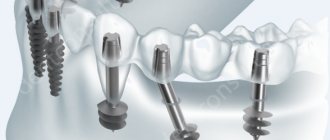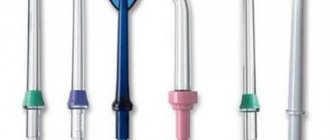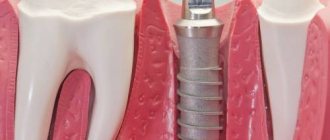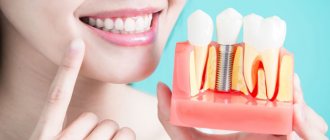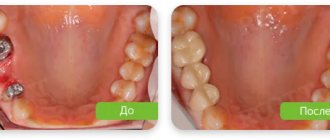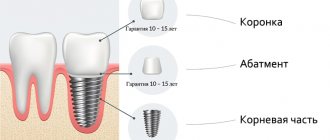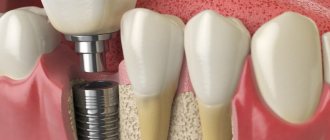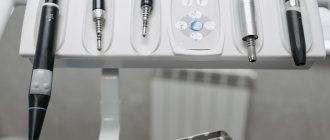Patients often ask why we use only Nobel Biocare products (implants, abutments and other components). Let's take a closer look at each of the popular brands of implants and compare them with each other.
Moscow clinics offer a wide range of dental implants, the installation price of which varies widely. These are implants from different manufacturers, differing in material composition, service life and load capabilities. Below is a comparative table of the main brands of implants from the premium segment to economy
| Implant system | Segment | Survival rate | Implant service life* | Titanium quality |
| Nobel Biocare (Sweden/USA) | Premium | 99,7% | More than 25 years | Grade 4** |
| Astra-Tech (Sweden) | Premium | 98% | 15-20 years | Grade 4 |
| Straumann (Switzerland) | Premium | 98% | 15-20 years | Roxolid *** |
| Ankylos (Germany) | Business | 98,5% | 15-20 years | Grade 4 |
| Xive (Germany) | Business | 98,5% | 15-20 years | Grade 4 |
| Osstem (South Korea) | Standard | 97% | 10 years | Grade 4 ***** |
| Implantium (South Korea) | Standard | 97% | 10 years | Grade 4 |
| Alpha-Bio (Israel) | Economy | 96% | 7 years | Ti-4Al-6V **** |
| Mis (Israel) | Economy | 96% | 7 years | Ti-4Al-6V |
*Subject to complete sanitation of the oral cavity and satisfactory general somatic condition of the body (health status).
** Grade 4
– Type 4 medical titanium according to Western nomenclature, a combination of high strength alloy and purity of titanium, the gold standard of modern implantology.
*** Roxolid
– “titanium-zirconium” alloy, developed by Straumann, combines high strength and bioinert qualities, but there is an insufficient number of independent studies.
**** Ti-4Al-6V
– titanium-aluminum-vanadium alloy, has ultra-high strength, but has low bioinert qualities (which affects the service life of the implant); in some Western nomenclatures it is classified as industrially pure alloys (not medical).
***** There is currently no reliable data on the type of titanium from which Osstem implants are made.
Dental implant companies and manufacturing countries
Today, there are a number of manufacturing countries that occupy a prominent place on the implantology map. Dental implant companies located in these countries produce about 90% of the total number of implants on the market. If you go to the website of any dentistry, then in the “implantation” section you will probably see countries such as the USA, Switzerland, Germany, Israel and Korea. Most ordinary people do not know how this or that implant differs, but at the same time, any sane person realizes that a two- or three-fold difference in price should imply at least some differences. That is why the question: “Which brand of dental implants is better?” – asks most patients. It is difficult to answer this unequivocally, because each clinical case may have its own recommendations and limitations. Below is a rating of dental implants by manufacturers from different countries, which will help you understand the variety of systems, their advantages and disadvantages.
What you need to pay attention to first
When choosing a suitable orthopedic design, the following characteristics must be taken into account:
Material.
Titanium is mainly used for the manufacture of implants; it is characterized by high wear resistance, strength and reliability. Titanium roots do not cause allergies and have excellent biocompatibility with the body. Some companies produce systems with a major proportion of titanium and a small amount of impurities. This solution allows us to reduce the final cost of the product, but at the same time the rate of implant engraftment and its service life are reduced.
Manufacturer's reputation.
Implants manufactured by European countries and the USA are in particular demand in the dental market; implantologists prefer them for ease of use, high aesthetic performance and reliability of the design. Products of these brands have high quality standards and in almost 99% of cases successfully fuse with bone tissue.
Options.
At the preparatory stage, the implantologist selects a suitable model for the patient, taking into account the condition of the bone tissue. Modern orthopedic companies are developing implantation systems that include different series, differing in length and diameter.
Surface.
The stability of the implant and the speed of its osseointegration with bone tissue largely depend on the quality of the surface of the product. Many companies have developed their own unique coating, thanks to which the titanium root is reliably stabilized in the bone, and the risk of complications is reduced to zero.
An implantologist will help you make the right choice; based on the results of the examination, he will determine which orthopedic system is right for you. The specialist at the A-medic clinic takes into account the individual preferences of the patient, his financial capabilities and, of course, the complexity of the clinical case.
Swiss dental implants
Switzerland is often associated with the production of cheese and watches, but implantation can also be added here. It is this country that produces the highest quality, most expensive and well-known brands of implants. We are talking, first of all, about Nobel Biocare and Straumann. They have the highest survival rate (99% and above) and the best technology. It is Swiss implants that allow you to obtain ideal aesthetic and functional results even in the most difficult cases. The majority of clinicians in the world prefer to work with Swiss manufacturers, many of whom are real luminaries of implantology. By the way, to use the capabilities of these systems 100%, you need to be really high-level specialists. Now about the less pleasant moments. The cost of implants from Switzerland is the highest on the market. On average, for the installation of Nobel Biocare or Straumann implants alone, you will have to pay 45–50 thousand rubles. Add to this cost the cost of prosthetics, and you will get a sum close to 100 thousand.
Swiss dental implants Nobel Biocare
American dental implants
The most popular American dental implants are Bicon, Biohorizon, as well as implants from the Denstply concern. If the first two systems can be considered local developments, then Dentsply is a slightly different story. A huge holding company, which has been selling dental equipment since its founding (and this is 1899), at some point wanted to enter the implantology industry. The company did not start from scratch and invest huge amounts of money in developing its own technologies, but simply gradually acquired several good European manufacturers with all the staff and developments. We are talking about Ankylos (Germany), Xive (Germany) and Astra Tech (Sweden). The most successful was the purchase of Astra Tech, which was in the top 3 and occupied about 30% of the implantology market. Despite the merger with Dentsply, all acquired companies retained their brand and continue to produce implants under it.
Americans are excellent businessmen who have taken marketing and PR in dentistry to a whole new level. At the same time, American dental implants also mean quality, high survival rate and reliability. On average, you will have to pay 30–35 thousand rubles for American-made implants (BioHorizons, Ankylos, Xive), and the elite Astra Tech will cost 40–45 thousand.
Bicon line of American dental implants
Kinds
Dental implants can be divided into several types, differing in strength, design shape and installation technology:
- Root-like. The most popular of all types of implants, which are a special threaded cylinder, which is based on a titanium screw. They are used only if the patient has a large amount of bone. If there is not enough space to install a root-shaped implant, specialists either artificially increase the mass of bone tissue (sinus lift operation) or install a different type of implant.
- Lamellar. Implants that allow for maximum penetration into the jawbone, which, in turn, ensures the stability of this mechanism. Their help is used when the bone width is insufficient, that is, when it is almost impossible to install a root-shaped implant.
- Combined . They are a combination of the two previous types of dental implants and have a rather complex shape. Used in the presence of all kinds of dental defects.
- Subperiosteal implants. Designs that belong to the so-called fragile mechanisms, used when the patient has very thin bone tissue. They are placed under the gum. Despite their “openwork”, subperiosteal implants occupy a relatively large surface and, due to this, are firmly held between the bone and periosteum of the jaw.
- Endodontically stabilized . Many experts consider this type of implant to be the best, justifying their choice with a high degree of reliability and the absence of the risk of injury to the oral mucosa. This design is used when it is necessary to strengthen or lengthen the root of a tooth.
- Intramucosal . The only type of implants that does not require screwing the prosthesis into the jawbone, which is used when it is necessary to stabilize dentures.
German dental implants
Germany is also one of the most famous manufacturers of dental implants. Having started their activity mainly in the 80s, German implant manufacturers have established themselves with excellent product quality and successful developments, which subsequently contributed to the merger with American concerns. Today Germany is represented by SHUTZ, Xive, Ankylos, Impro, and other lesser-known systems. All of them are close to the top segment, have a good line of implants and orthopedic solutions. Precision and scrupulousness are valued all over the world, which is why German dental implants have many fans among specialists.
German-made dental implants cost an average of 30–35 thousand rubles, which puts them on par with most American-made implants. Ankylos will cost a little more (about 40 thousand) - a system whose characteristics are closest to the luxury class.
Line of German dental implants Zimmer
Korean dental implants
In the 90s, the field of medicine and dentistry became one of the priorities for the Korean economy, which allowed the country to become one of the leading suppliers of dental equipment. In the production of implants, Korea represents the budget category, and the most famous Korean dental implants are Osstem and Implantium. The advantages (besides the price) include a very wide range of models and good survival rate. They are quite popular on the Russian market, especially in the Far Eastern region of our country. However, some experts believe that these implants are not intended for all clinical cases and are inferior to top-end systems in terms of achieving an aesthetic result. Today, the price of Korean dental implants averages about 20 thousand rubles, which is quite good, considering their quite acceptable quality.
Line of Korean dental implants
Israeli dental implants
Together with Korean implants, Israel occupies an economy class niche, and the Alpha Bio and MIS systems (especially the first) are very popular in Russia. This is not only due to price: the manufacturer invests significant sums in promoting its products. Israeli dental implants are very reliable, are well suited for restoring the chewing part of teeth and do not require the clinician to have any outstanding skills. In general, reviews of Israeli dental implants are very positive. However, there are also weak points.
Many clinicians note the lack of wide possibilities in prosthetics, which inevitably affects aesthetics.
The price of Israeli dental implants is very attractive. For 17–20 thousand, clinics offer installation of a titanium root, and turnkey implantation will cost an average of 40 thousand rubles. If lesser-known Israeli systems are used, the price will be even lower.
Israeli dental implant MIS
How is the price of implantation determined?
The final price of implant-supported prosthetics includes all treatment costs - the protocol used, the type of implantation system, the method of dentures, the material of the orthopedic structure, additional interventions (osteoplasty, sinus lift, gum surgery, etc.). The doctor decides which dental implant is best to place based on the clinical picture.
The network of RUTT clinics in Moscow uses a case pricing mechanism (turnkey). This includes all stages of treatment - from preparation of the oral cavity, to control examinations, production and installation of temporary dentures. The ROOTT implant system comes with a lifetime warranty .
Russian dental implants
Dental implants are also produced in Russia, although few people know about it. For example, there are IRIS implants - an improved LIKO-M system, which appeared more than 20 years ago. IRIS is produced in Italy using Russian technology and has an international certificate of ISO 9001-2000.
The abbreviation IRIS stands for Innovative Russian Dental Implant System Liko-M. Implants are made from pure GRADE-4 titanium. Premium implants from Nobel Biocare, Astra Tech, Straumann are made from the same material.
The first implant was developed in 1995 by a team of scientists led by Doctor of Medical Sciences, Professor, Corresponding Member of the Russian Academy of Sciences Sergei Yuryevich Ivanov. The scientific basis of the Iris Liko-M system is 55 dissertations defended under his leadership.
What is an implant and implantology?
Implantology is a fairly young area of dentistry, which originated in the middle of the last century, as a result of the engraftment of titanium into bone tissue, better known as osseointegration.
This is interesting! The world's first operation to implant a titanium root was performed by the Swiss under the leadership of Professor Ingvar Brånemark.
The rapid development of this technique led to the fact that at the end of the 80s of the 20th century the whole world knew about it.
So, an implant is an artificial root consisting of titanium, which is screwed into the bone tissue. It quickly takes root in the place of the missing tooth due to the unique properties of the metal.
A tooth with an implanted root consists of three parts:
- directly the implant itself;
- crowns;
- abutment.
It is worth noting that, if necessary, the abutment, which is a connecting element, can be changed, as well as the crown. Whereas the implant is screwed into the bone tissue forever, thus solving the problem of millions of people who suffer from missing teeth.
- Complete restoration of the dentition in just 4 days!
more detailsRoott Pterygoid Implants Sinus lift is no longer needed!
more details
Once and for life! Express implantation in 4 days with a permanent ReSmile prosthesis
more details
All-on-4, All-on-6, ReSmile, Zygomatic implantation We use all modern methods of dentition restoration
more details
How important is the manufacturer of a dental implant?
In conclusion, I would like to note that the brand certainly influences the cost of the implant, but it is naive to think that you are paying such large sums just for the name. Top implants offer the broadest possible options for both the patient and the clinician. None of these systems compromise between functionality and aesthetics: it allows you to solve the patient's problem and give him a beautiful smile, even in difficult clinical situations in which a budget system could not perform in the same way. However, economy class systems today are of very high quality and, for certain indications, can become a worthy alternative to more expensive analogues.
